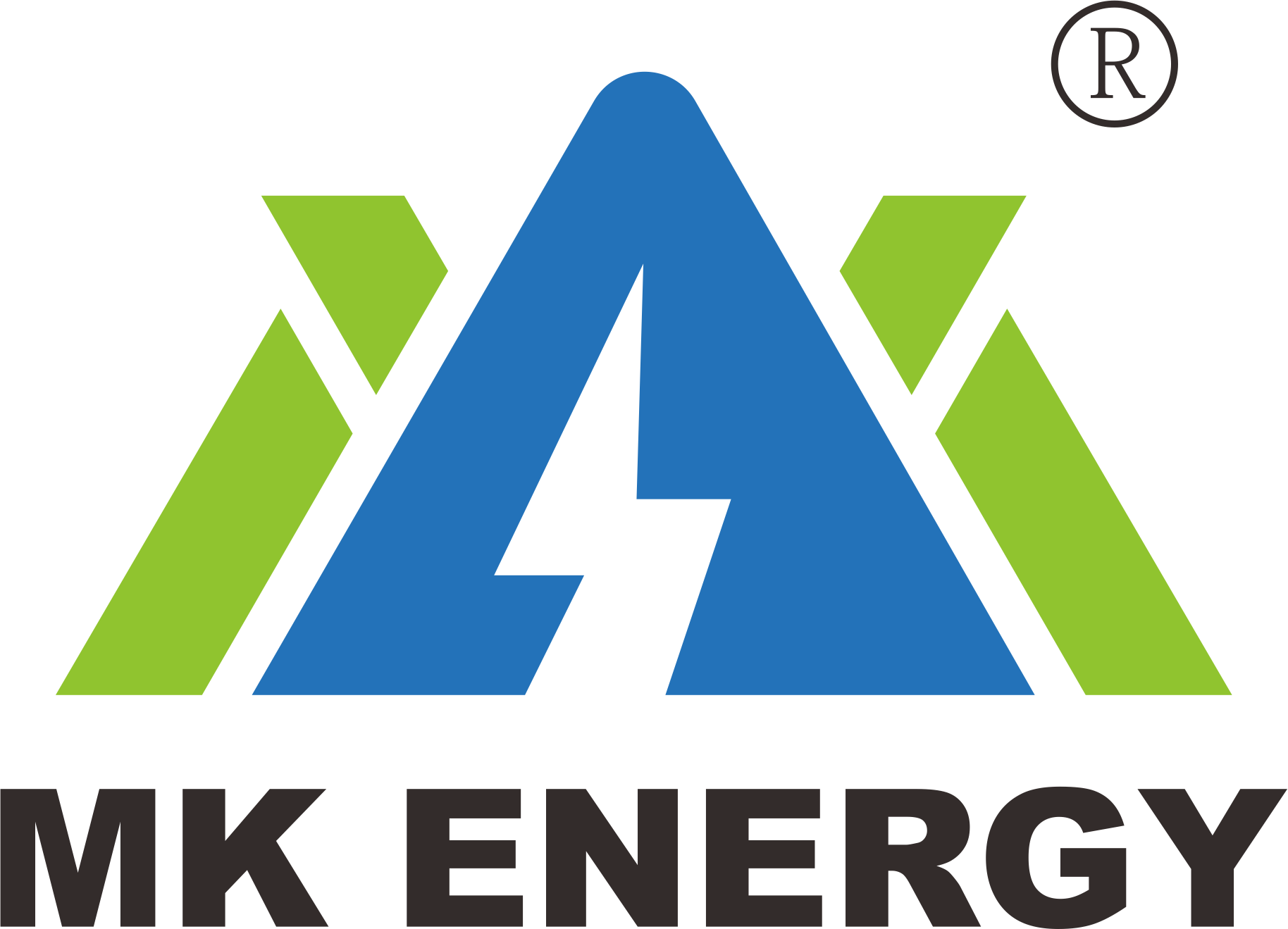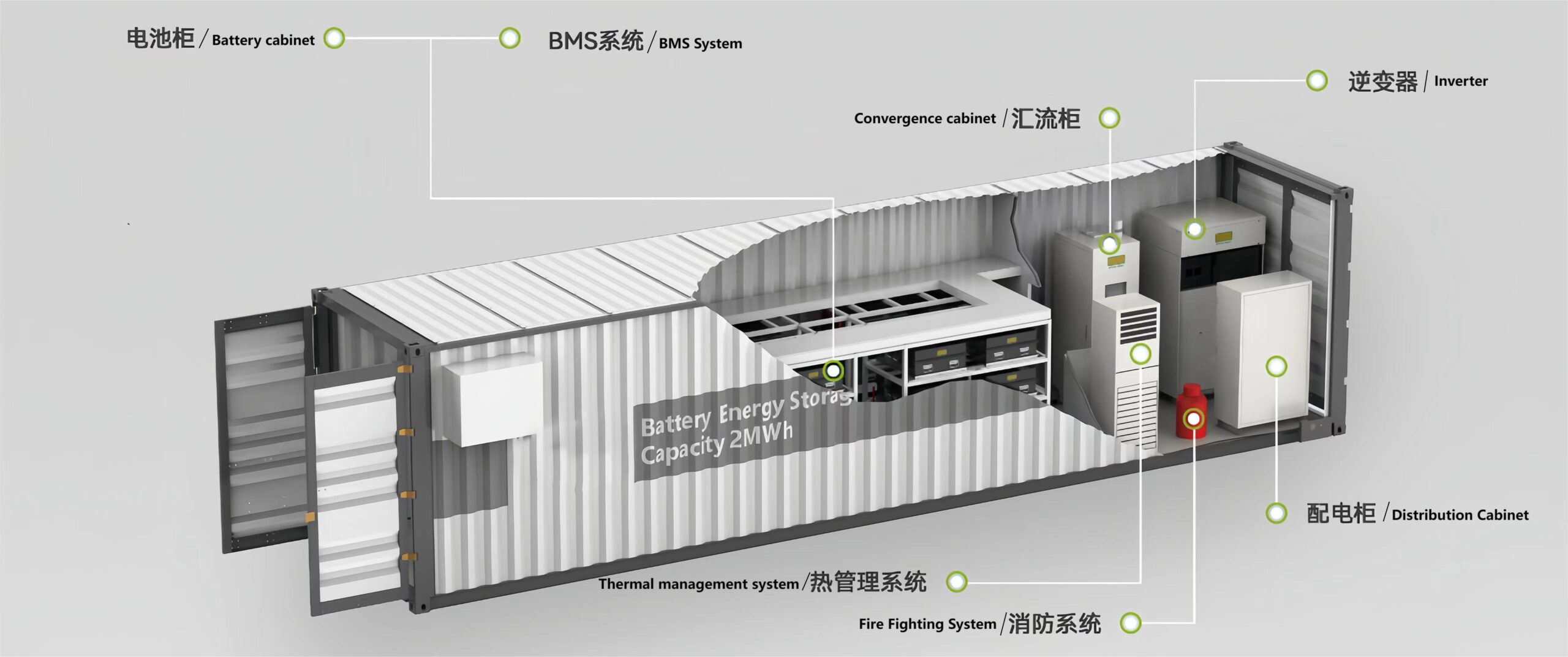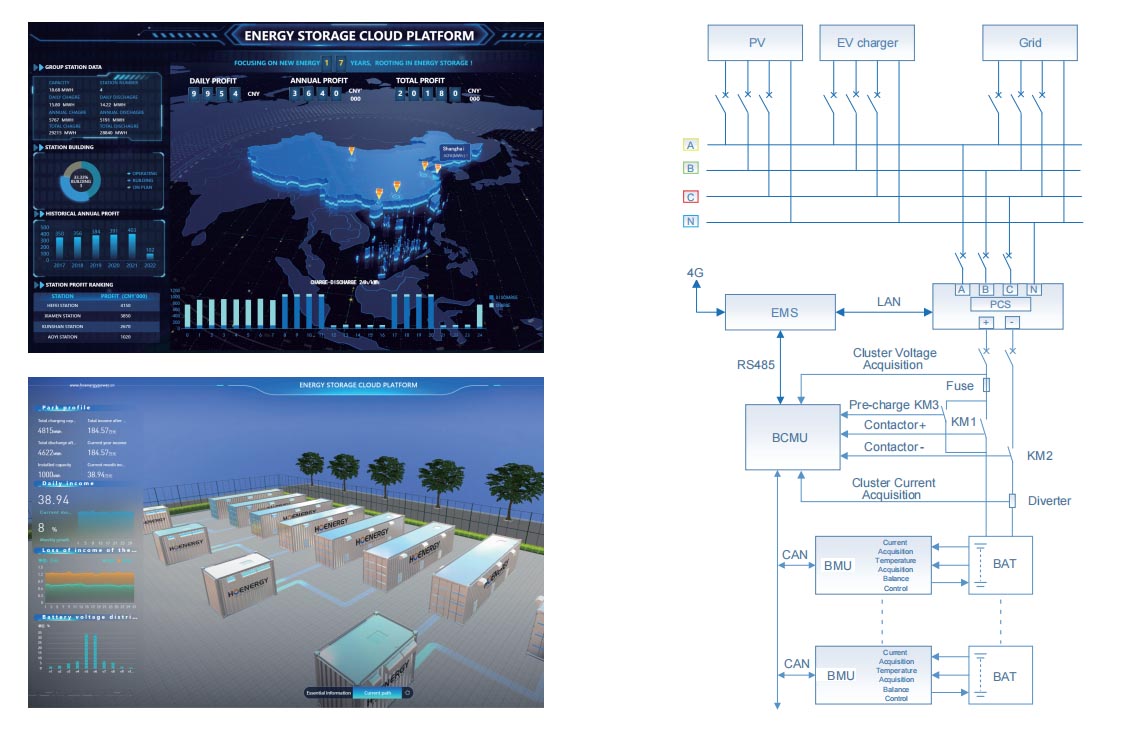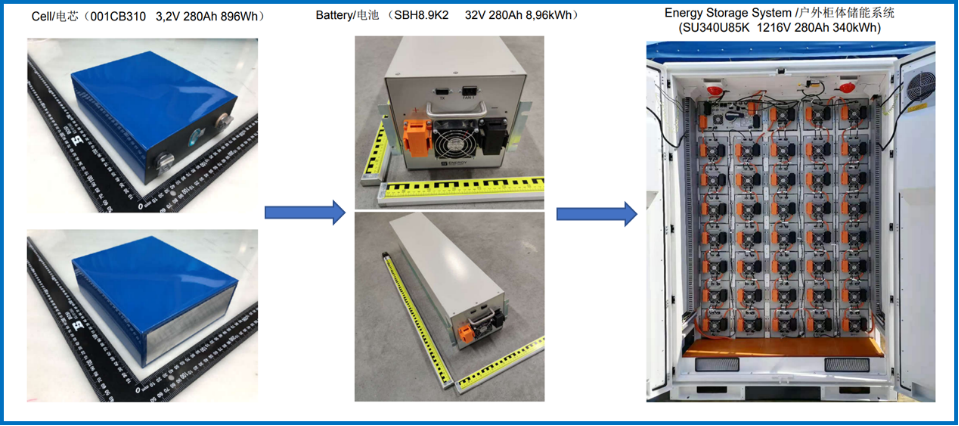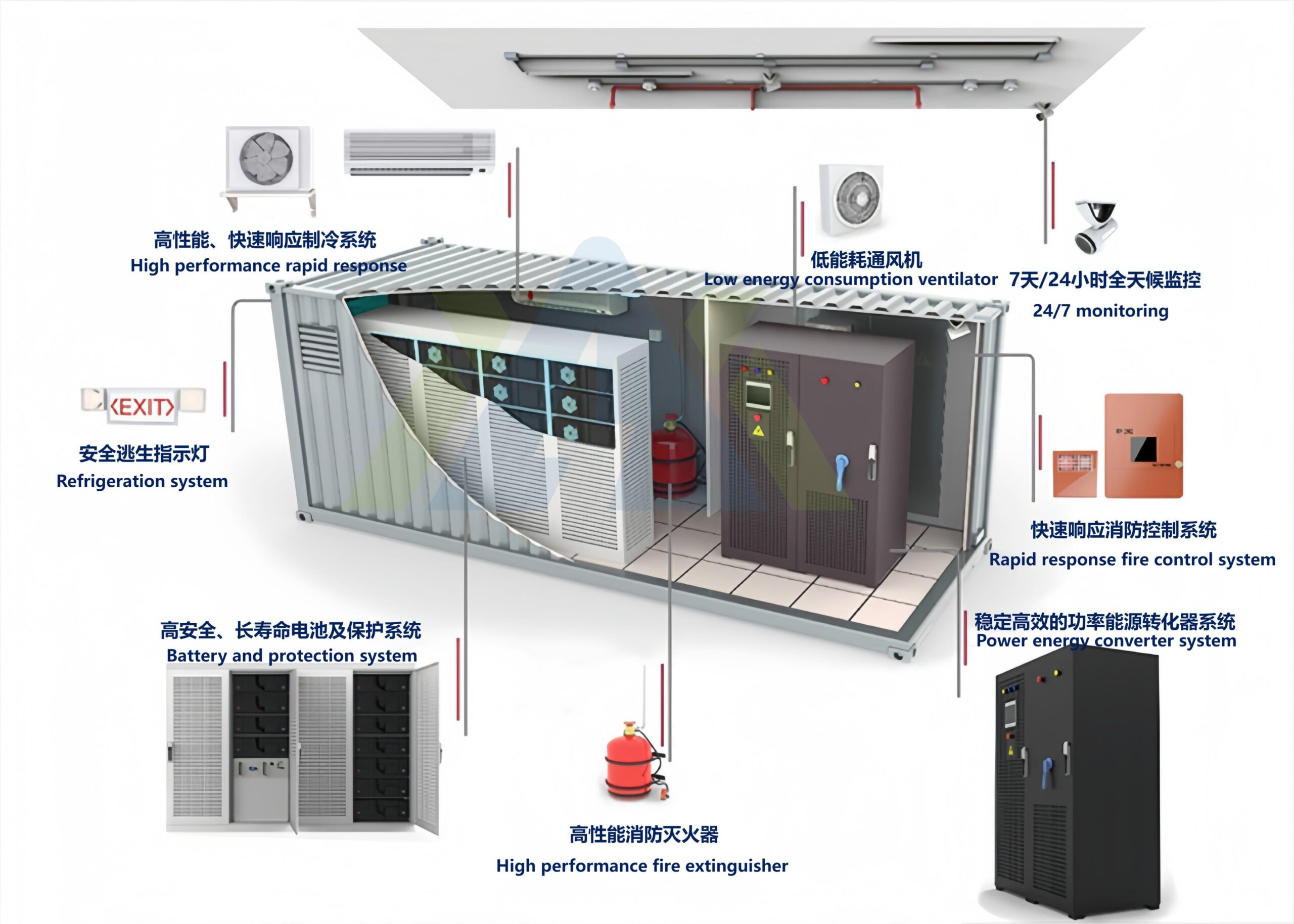This article introduces the structural design and system composition of energy storage containers, focusing on its application advantages in the energy field. As a flexible and mobile energy storage solution, energy storage containers have broad application prospects in grid regulation, emergency backup power, and renewable energy integration.
The article aims to provide readers with a comprehensive understanding of energy storage container technology to promote its widespread application and promotion in the future energy field.
Structural design
Battery compartment
It mainly includes batteries, battery racks, BMS control cabinets, heptafluoropropane fire extinguishing cabinets, cooling air conditioners, smoke sensing lighting, surveillance cameras, etc. The battery needs to be equipped with a corresponding BMS management system.
Battery types can be lithium iron batteries, lithium batteries, lead-carbon batteries and lead-acid batteries. The cooling air conditioner adjusts in real time according to the temperature in the warehouse. Surveillance cameras can remotely monitor the operating status of equipment in the warehouse. A remote client can be formed to monitor and manage the operating status and battery status of the equipment in the warehouse through the client or app.
Equipment warehouse
The equipment warehouse mainly includes PCS and EMS control cabinets. PCS can control the charging and discharging process, perform AC and DC conversion, and can directly power AC loads when there is no power grid.
In the application of energy storage systems, the function and role of EMS are relatively important. In terms of distribution network, EMS mainly collects the real-time power status of the power grid through communication with smart meters and monitors changes in load power in real time. Control automatic power generation and evaluate power system status.
System composition
It is generally composed of energy storage battery system, monitoring system, battery management unit, special fire protection system, special air conditioner, energy storage converter and isolation transformer.
Battery system
It is mainly composed of battery cells connected in series and parallel. First, more than a dozen groups of battery cells are connected in series and parallel to form a battery box. Then the battery boxes are connected in series to form a battery string and increase the system voltage. Finally, the battery string is connected in parallel to increase the system capacity and is integrated and installed in the Inside the battery cabinet.
Surveillance system
It mainly implements the functions of external communication, network data monitoring and data collection, analysis and processing to ensure accurate data monitoring, high voltage and current sampling accuracy, fast data synchronization rate and remote control command execution speed. The battery management unit has high-precision single voltage detection. With the current detection function, it ensures the voltage balance of the battery modules and avoids circulation current between battery modules, which affects the system operating efficiency.
Fire Fighting System
In order to ensure the safety of the system, the container is equipped with a dedicated fire protection and air-conditioning system.
Fire alarms are sensed through safety equipment such as smoke sensors, temperature sensors, humidity sensors, and emergency lights, and fires are automatically extinguished. The dedicated air conditioning system controls the air conditioning cooling and heating systems through thermal management strategies based on the external ambient temperature to ensure that the temperature inside the container is within the appropriate range and extend the battery life. service life.
Energy storage converter
It is an energy conversion unit that converts battery DC power into three-phase AC power. It can operate in grid-connected and off-grid modes. In grid-connected mode, the converter interacts with the power grid according to the power instructions issued by the upper layer dispatching; in off-grid mode Energy storage converters can provide voltage and frequency support for factory loads and provide black-start power for some renewable energy sources.
The outlet of the energy storage converter is connected to the isolation transformer to completely insulate the primary side and secondary side electrically, ensuring the safety of the container system to the greatest extent.
Advantages and applications
Advantage
- Modular design
ISO standard dimensions allow ocean shipping and road transportation to be facilitated. They can be hung from overhead cranes, boats, trucks and temporary sites.
- Rugged and durable design
ISO protects goods during transportation and will provide good protection from weather, transportation and other environmental damage during the life of the energy storage system.
- Mobility design
Comprehensive comparison with other energy storage batteries, the advantages of lithium battery energy storage technology lie in quality and volume, strong mobility, and no geographical restrictions.
- Flexible base design
Containers are easily adaptable to any desired option. This includes access to air conditioners, photovoltaics, fans, access doors, power cable access and other equipment.
Application
As a unit, the 1 MWh energy storage system has wide applicability. It can expand the capacity through parallel combination of multiple units. It has a good competitive advantage. It can also be connected to new energy sources or connected to the power grid as a distributed power supply of a smart grid.
New energy access
Since new energy sources such as wind energy and solar energy are characterized by strong randomness, high intermittentness, and rapid changes in output, the direct connection of new energy sources to the grid, especially large-capacity ones, will have a certain impact on the dispatch and control of the power grid, and even Will interfere with the stability of the power grid. Through the joint application of battery energy storage systems and renewable new energy, randomly changing output power is converted into relatively stable output, ensuring the stability of the power grid system.
Backup power
In remote areas, areas with poor power supply reliability or areas with important loads, MW-level battery energy storage systems can be used as backup power sources to provide power for power grid systems that fail or distribution systems that require maintenance. MW-scale containerized battery energy storage systems can be transported to a region and provide a localized source of electricity. When severe weather damages the public power grid system, it can be used for emergency rescue; or it can be used in areas that are not yet connected to the power grid. The MW-class containerized energy storage system can be integrated into the power grid for charging, and can also be configured with new energy sources for storage and electrical energy supply.
Microgrid
When the microgrid operates in isolation, the randomness of distributed energy resources and user loads is very large, making it difficult to ensure the real-time balance of power generation and consumption, resulting in a large range of frequency fluctuations and severe voltage fluctuations. Large-capacity and efficient battery energy storage technology can suppress interference from the external grid, ensure power quality for local users, and further achieve smooth operation of microgrids.
The container energy storage system has the characteristics of simplified infrastructure construction costs, short construction period, high degree of modularity, and easy transportation and installation. It can be applied to thermal, wind, solar and other power stations or islands, communities, schools, scientific research institutions, factories, large Load centers and other applications.
MK Energy has rich experience in lithium battery manufacturing and provides quality services to customers in many countries and regions. If you need it, please feel free to contact us!
